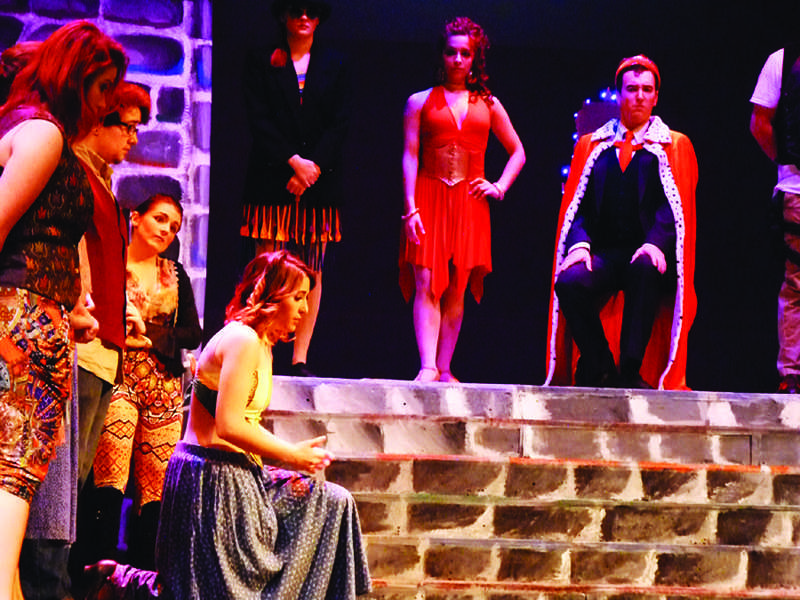“Pippin” spreads a little sunshine, Dibden-style
A peasant (Danielle Godjikian) makes an appeal in the JSC production of “Pippin”
Kudos to director Patrick Houle for picking the liveliest play performed in Dibden in years (excluding Liz Thompson’s senior play, “The American Dream,” performed last semester).
That’s “Pippin,” which was performed in Dibden Nov. 6-9.
“Pippin” is a musical, written by Stephen Schwartz and first performed on Broadway in ‘72. That initial run, which was directed by Bob “All That Jazz”/”Cabaret”/I-stole-the-Oscar-from-Francis-Ford-Coppola Fosse, has been described as disturbingly surreal.
The Dibden take on “Pippin” was neither disturbing or surreal. The version of “Pippin” licensed for “amateur” productions has been called “emasculated.”
The Dibden performance certainly seemed harmless, but it was also clearly a shot at bursting a bubble of excitement over Dibden, which has had a rather eccentric run of plays over the past few years, ranging from “Bat Boy: The Musical” to “Little Women.”
Jonathan Howard played the lead role, to the apparent delight of the audience. He’s a perfect choice in that his strong suit is playing the bridge between stage and audience.
He’s keenly aware of the people who’ve come to be entertained, and rather than feel, Patrick Stewart-style, he focused on dredging as much entertainment value out of the character as he possibly could. Judging by the perfectly timed laughs and enthusiastic applause, job well done.
Here are two of my favorite standouts.
Adam Schuler, who played the King, is the closest thing to an atomic bomb Dibden might have right now. I mean that in a good way.
This guy has the comedic timing of a savant. He’s clearly well aware of the audience, but he doesn’t show it: he dives into the part, which he’s already figured out, and plays everything with an outrageous richness: every verbal jab, every flamboyant outcry, every cocked eyebrow–this guy’s got it down. If he isn’t utilized in every henceforth play, they’ve either made a terrible mistake or he’s playing it Daniel Day-Lewis-style.
Another standout: Vanessa Cousins. She has an amazing way of throwing herself out there. It’s shameless and it has to be. Her shining moments in the play were when she was left alone, free to dance across the stage, showing off, switching between vocal highs and lows like Madonna singing “Crazy for You”–she’s a good physical actor.
I’d like to see her in a more modern, va-va-voom role–Marilyn Monroe-style. Something smoky, sexy, and funny. If she has to sing, so much the better. She’s got the pipes, she’s got the moves, and she’s got the attitude.
There was something off about most of the sequences: the set design, which was oddly sparse considering the flamboyancy of the music and the majestic setting, or maybe those actors who couldn’t figure or didn’t care how to connect with the audience.
The one sequence they nailed was the flirtation scene, in which Howard’s Pippin is assaulted by a cadre of wildly randy young women–and one young man. The music was right, the wildcat yelps of randiness were right, the choreography was sensually natural.
And extra credit for using Basement Medicine as a prop–not to start a fire or as toilet paper but, of all things, to read.
Tom Benton joined the Basement Medicine staff in spring 2011, assuming the position of editor-in-chief in spring 2012. He continues in that capacity...
Mariah Howland joined the Basement Medicine staff in fall 2011 and has served in a variety of capacities since then, most recently as photo editor in...






